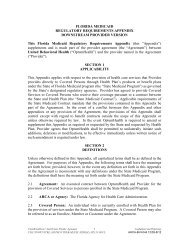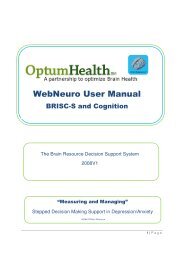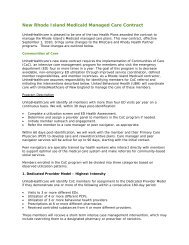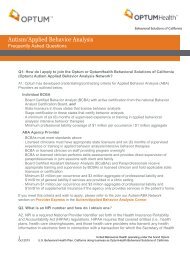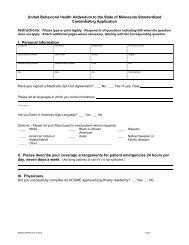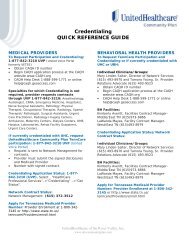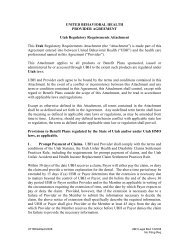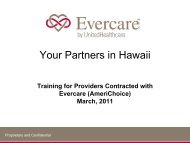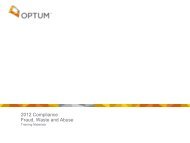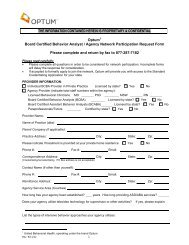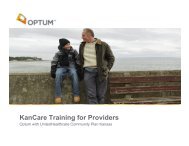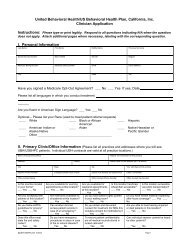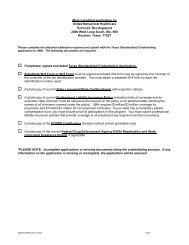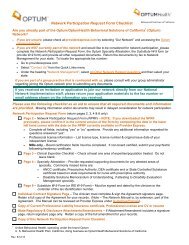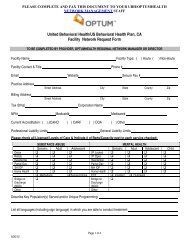Oppositional Defiant Disorder, Intensive Outpatient ... - Ubhonline.com
Oppositional Defiant Disorder, Intensive Outpatient ... - Ubhonline.com
Oppositional Defiant Disorder, Intensive Outpatient ... - Ubhonline.com
Create successful ePaper yourself
Turn your PDF publications into a flip-book with our unique Google optimized e-Paper software.
for such programs may not be supported by the benefit plan (AACAP,<br />
2007).<br />
• School-based interventions may include preventive programs<br />
that focus on the development of socio-emotional skills, selfcontrol<br />
and problem solving (AACAP, 2007).<br />
o Individual approaches should be behaviorally based and geared<br />
toward the development of problem-solving skills. Behavioral<br />
interventions can aim to control aggression, modify behavior, and<br />
enhance <strong>com</strong>munication and self-awareness (AACAP, 2007).<br />
o Structured group therapy may be most helpful for adolescents focusing<br />
on <strong>com</strong>munication, problem-solving and behavior management<br />
(AACAP, 2007).<br />
o Alternative family approaches include Functional Family Therapy<br />
(FFT) and Multisystemic Therapy shown to be most effective for<br />
members with ODD and Substance Use <strong>Disorder</strong>s (AACAP, 2007).<br />
o Inoculation approaches (e.g., boot camps, shock incarceration) have<br />
been considered ineffective and even harmful especially when used in<br />
isolation from evidence-based approaches (AACAP, 2007).<br />
o Interventions should be delivered as long as clinically indicated,<br />
usually for several months with periodic “booster” sessions, reinforcing<br />
learned skills for both the member and family/guardians (AACAP,<br />
2007).<br />
Pharmacotherapy<br />
<br />
<br />
<br />
<br />
Pharmacotherapy is generally not indicated to treat ODD as a sole<br />
intervention but may be helpful as an adjunct to psychotherapy to treat<br />
aggressive symptoms and/or <strong>com</strong>orbid conditions (AACAP, 2007).<br />
Medication intervention is best introduced after a strong alliance with the<br />
member and family has been established and only after psychosocial<br />
interventions have been implemented (AACAP, 2007).<br />
If <strong>com</strong>orbid conditions are present, medications specifically targeting those<br />
conditions should be chosen however, atypical antipsychotics, mood<br />
stabilizers (e.g., divalproex and lithium), and stimulants are often<br />
prescribed in treating acute aggression in a time limited manner (AACAP,<br />
2007).<br />
Medications should only be started after a symptom baseline can be<br />
established as to not attribute positive out<strong>com</strong>es to medications rather<br />
than a stabilizing environment (AACAP, 2007).<br />
If medication use is chosen, the child in addition to the parents should<br />
agree and it should be clearly assessed whether adherence and<br />
monitoring are issues of concern (AACAP, 2007).<br />
<strong>Intensive</strong> <strong>Outpatient</strong> Treatment of <strong>Oppositional</strong> <strong>Defiant</strong> <strong>Disorder</strong> (ODD) Page 8 of 14<br />
Coverage Determination Guideline<br />
Confidential and Proprietary, © Optum 2012<br />
Optum is a brand used by United Behavioral Health and its affiliates



